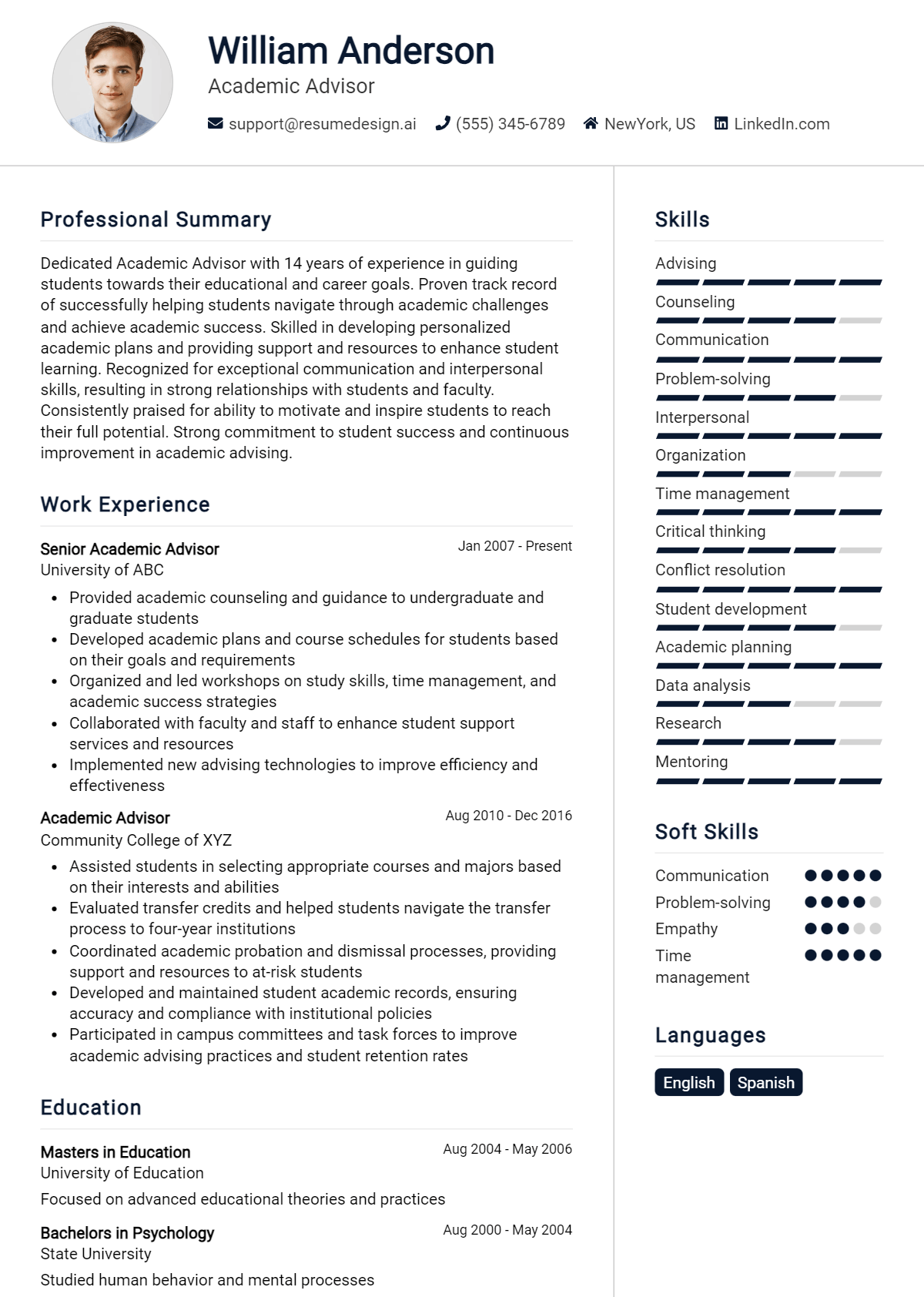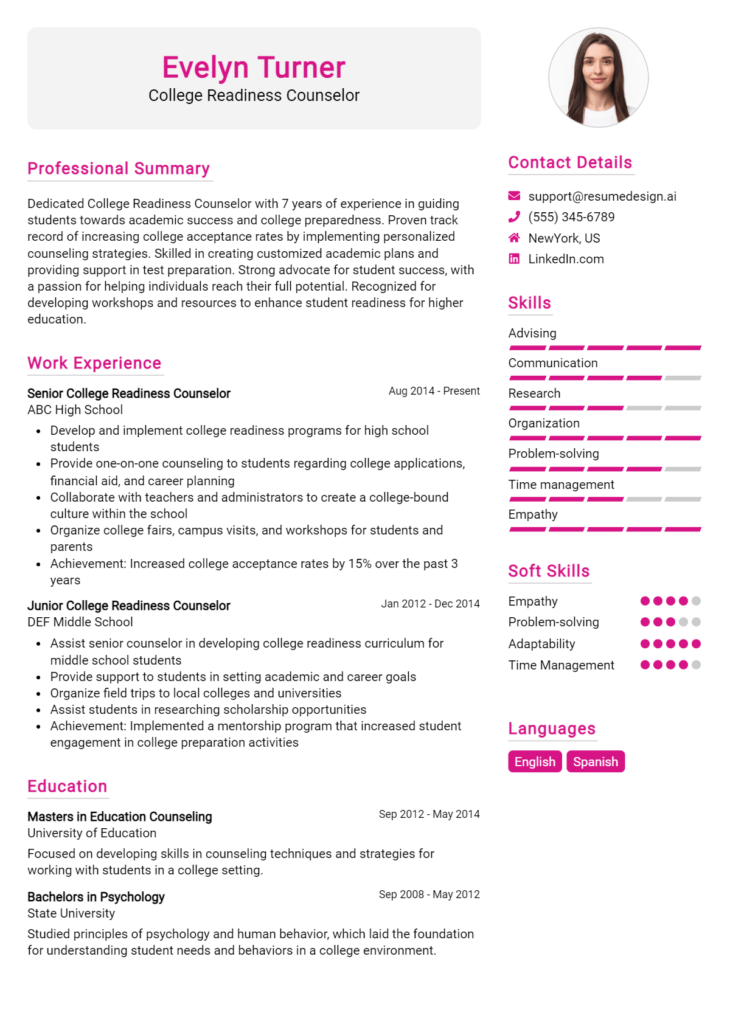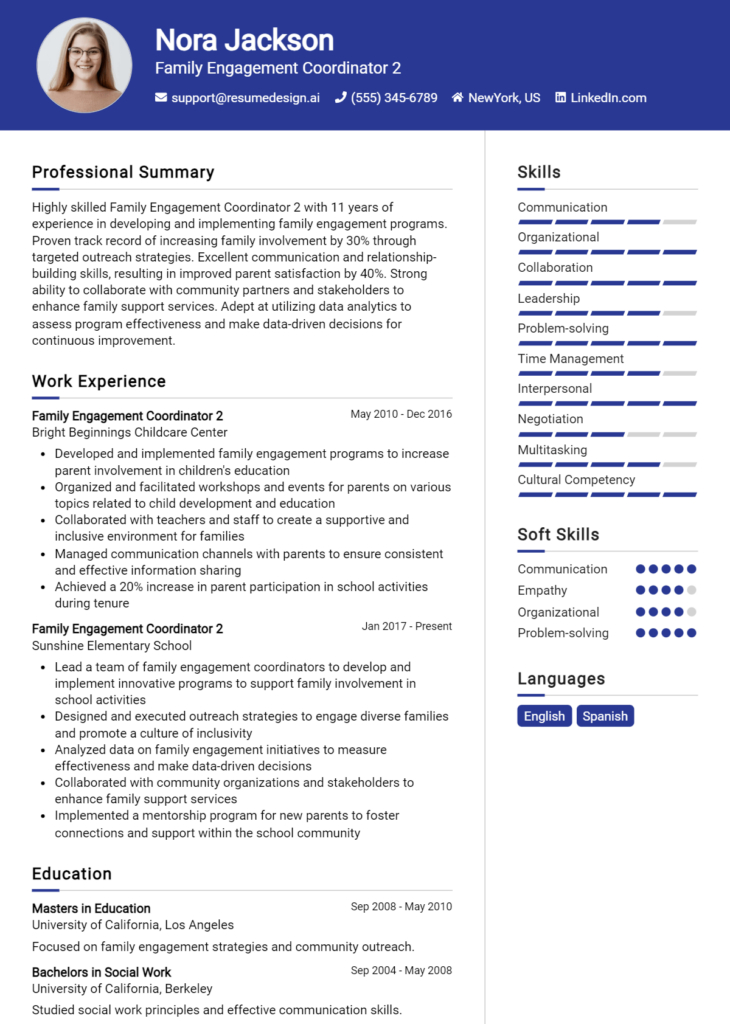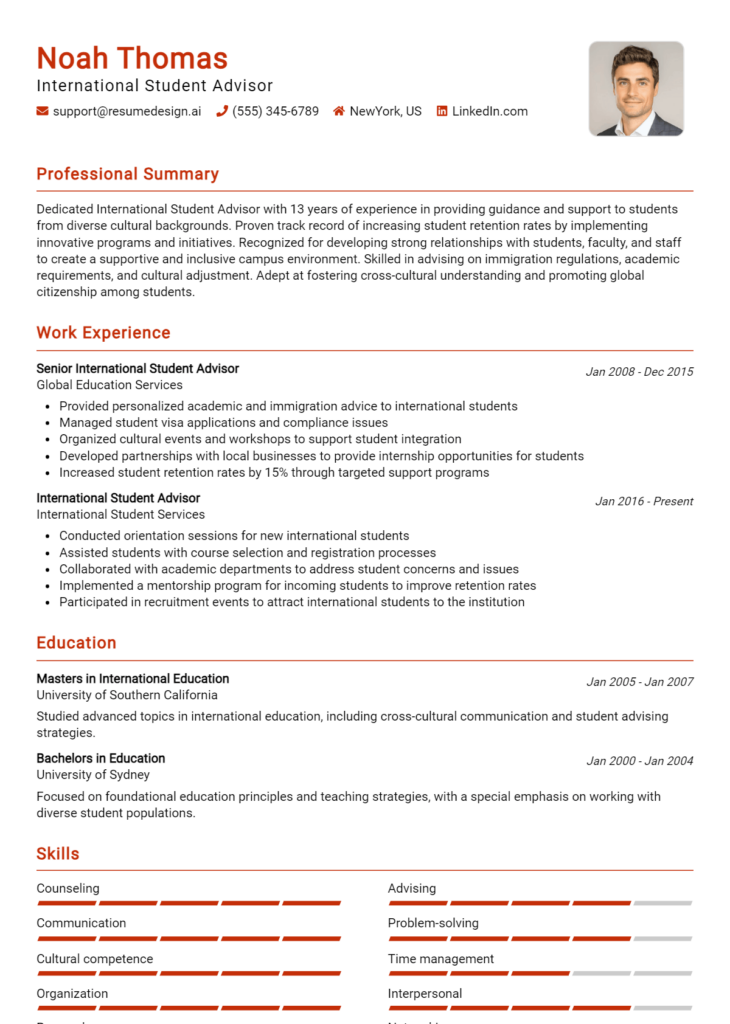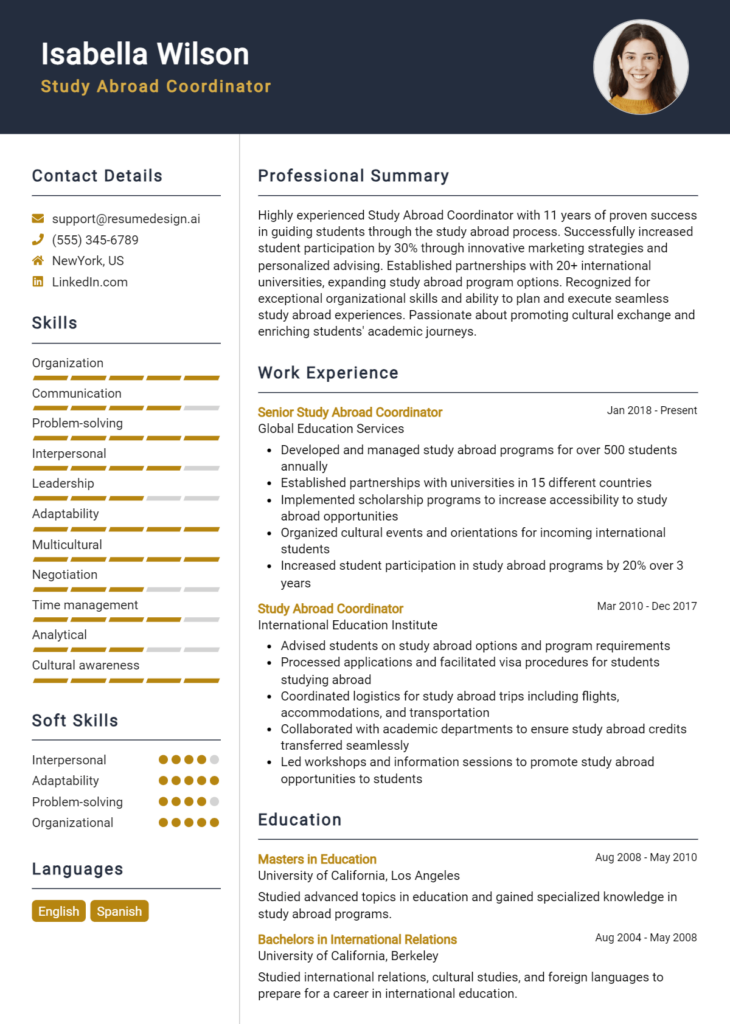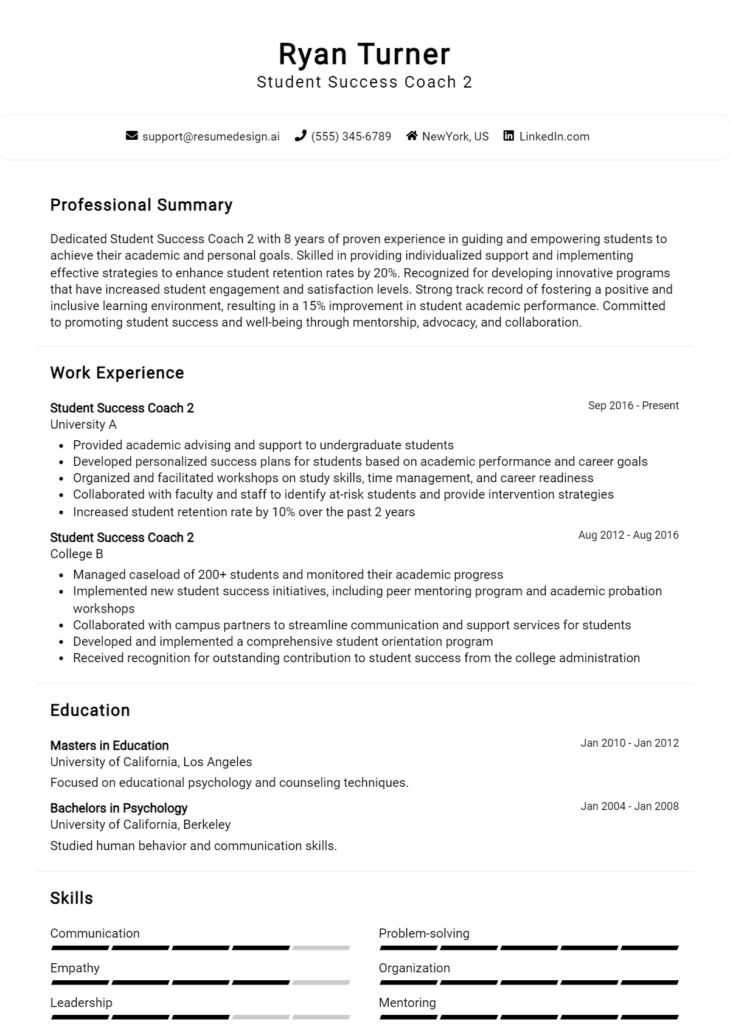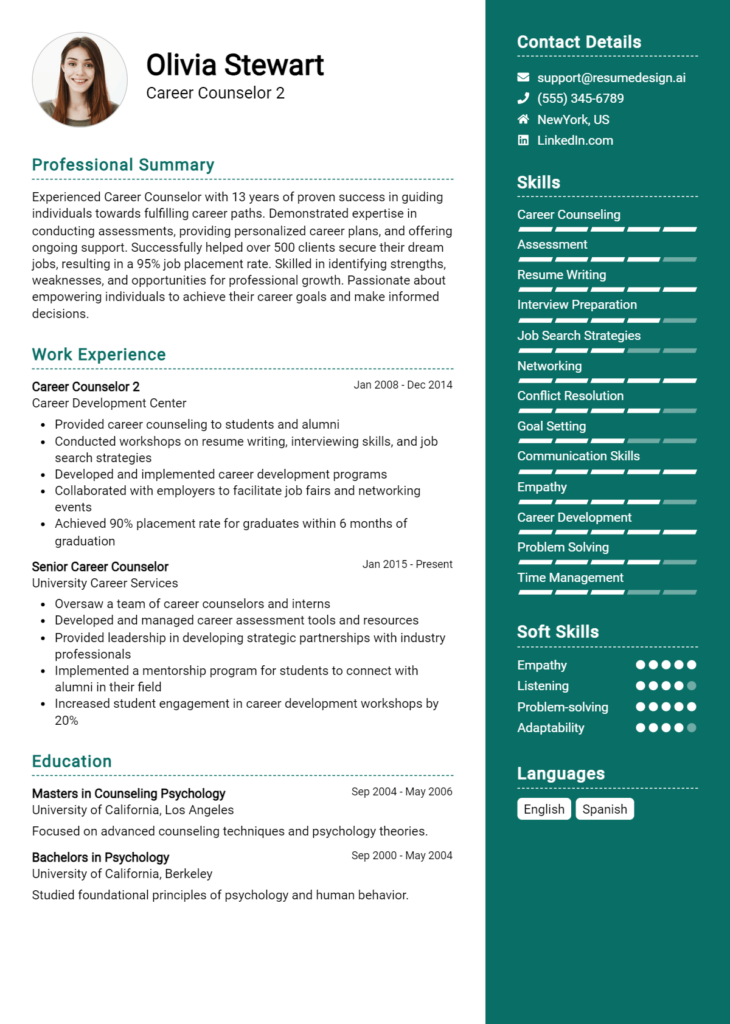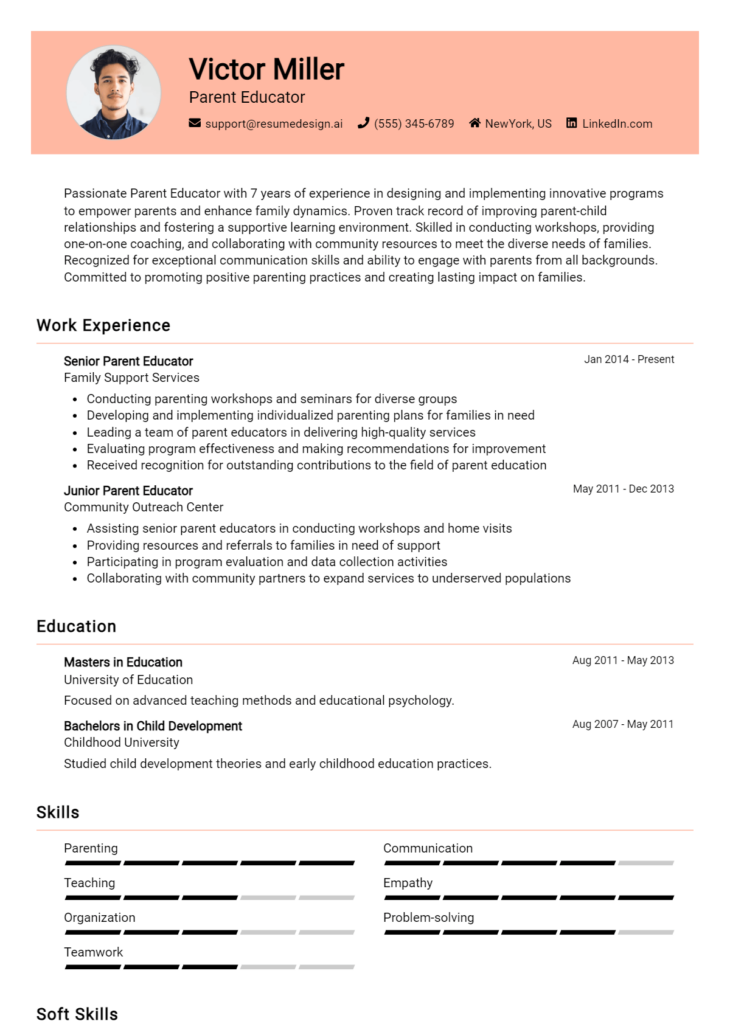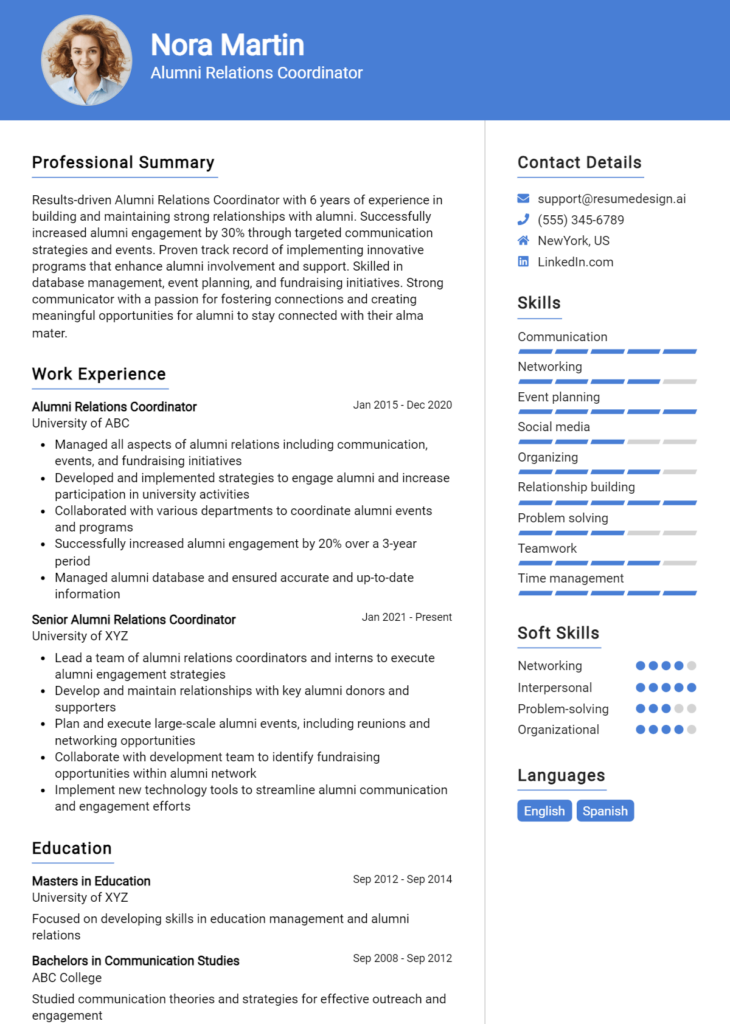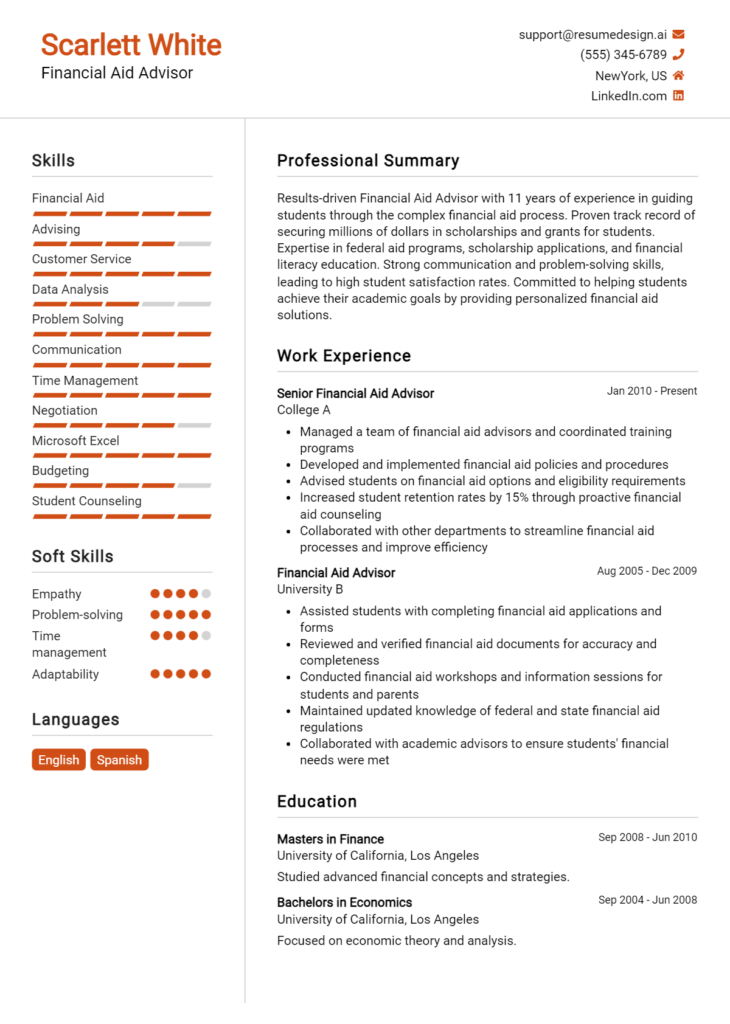Academic Advisor Core Responsibilities
Academic Advisors play a crucial role in guiding students through their educational journey, serving as a bridge between various departments such as admissions, faculty, and student services. They utilize strong technical, operational, and problem-solving skills to develop personalized academic plans, resolve student issues, and ensure compliance with institutional policies. By fostering collaboration across functions, Advisors contribute significantly to the organization's overall goals of student success and retention. A well-structured resume can effectively highlight these qualifications, showcasing the candidate's potential to make a meaningful impact.
Common Responsibilities Listed on Academic Advisor Resume
- Conduct individual and group advising sessions to support student academic progress.
- Develop and implement academic plans tailored to students' goals and needs.
- Monitor student performance and recommend interventions for at-risk students.
- Collaborate with faculty and staff to enhance student resources and support.
- Assist students with course selection and registration processes.
- Provide information on degree requirements, policies, and academic resources.
- Organize workshops and events to promote academic success and engagement.
- Maintain accurate student records and ensure compliance with institutional policies.
- Advise on career pathways and opportunities for further education.
- Facilitate communication between students and various departments.
- Stay updated on academic programs and institutional changes.
High-Level Resume Tips for Academic Advisor Professionals
In today's competitive job market, a well-crafted resume is crucial for Academic Advisor professionals aiming to make a strong first impression on potential employers. As the initial point of contact, your resume needs to effectively showcase not only your relevant skills and qualifications but also your unique achievements in the field. A compelling resume serves as a reflection of your professional journey and can set you apart from other candidates. This guide will provide practical and actionable resume tips specifically tailored for Academic Advisor professionals, ensuring that your application stands out in the crowd.
Top Resume Tips for Academic Advisor Professionals
- Tailor your resume to the specific job description by incorporating relevant keywords from the posting.
- Highlight your educational background, including any degrees and certifications related to academic advising.
- Showcase your relevant experience, emphasizing roles that demonstrate your ability to guide and support students.
- Quantify your achievements by including metrics, such as the number of students advised or success rates of your initiatives.
- Highlight industry-specific skills such as academic planning, conflict resolution, and knowledge of educational policies.
- Include volunteer work or internships that relate to academic advising, demonstrating your commitment to the field.
- Use action verbs to convey your responsibilities and accomplishments, creating a dynamic and engaging narrative.
- Ensure your resume is well-organized and visually appealing to make it easy for hiring managers to read.
- Incorporate professional development activities, such as workshops or conferences attended, to show your ongoing commitment to learning.
- Proofread your resume thoroughly to eliminate any errors, as attention to detail is critical in the advising profession.
By implementing these tips, you can significantly enhance your resume's effectiveness, increasing your chances of landing a job in the Academic Advisor field. A polished and targeted resume not only showcases your qualifications but also demonstrates your dedication to helping students achieve their educational goals, making you a standout candidate in a competitive hiring landscape.
Why Resume Headlines & Titles are Important for Academic Advisor
In the competitive landscape of academic advising, a resume headline or title serves as a crucial first impression for candidates seeking to stand out to hiring managers. A strong headline quickly captures attention and effectively summarizes the candidate's key qualifications in a succinct phrase. By providing a snapshot of relevant skills and experience, a well-crafted resume headline can engage hiring managers right from the outset, prompting them to delve deeper into the applicant's qualifications. Therefore, it is essential that the headline be concise, relevant, and directly aligned with the specific academic advisor position being applied for, ensuring that it resonates with the needs and expectations of the educational institution.
Best Practices for Crafting Resume Headlines for Academic Advisor
- Keep it concise: Aim for one impactful sentence or phrase.
- Be role-specific: Tailor your headline to reflect the academic advisor position.
- Highlight key strengths: Focus on your most relevant skills and experiences.
- Use action-oriented language: Choose dynamic verbs to convey your contributions.
- Incorporate industry keywords: Utilize terms that align with the academic advising field.
- Avoid jargon: Keep language clear and accessible to a broad audience.
- Showcase accomplishments: If possible, include quantifiable achievements.
- Align with the institution's values: Reflect the mission and goals of the educational setting.
Example Resume Headlines for Academic Advisor
Strong Resume Headlines
Dedicated Academic Advisor with 5+ Years of Experience Enhancing Student Success
Student-Centered Advisor Specializing in Holistic Support and Degree Planning
Proven Track Record in Academic Planning and Student Engagement Strategies
Results-Driven Educational Advisor Committed to Fostering Academic Excellence
Weak Resume Headlines
Looking for a Job in Education
Academic Advisor
Experienced in Various Roles
Strong resume headlines stand out because they are specific, engaging, and aligned with the needs of the hiring institution. They highlight the candidate's unique qualifications and provide a clear indication of their expertise in academic advising. In contrast, weak headlines tend to be vague and generic, failing to convey any meaningful information about the candidate's strengths or suitability for the role. Such headlines do not capture attention and may leave hiring managers uninterested, ultimately reducing the chances of the candidate being considered for the position.
Writing an Exceptional Academic Advisor Resume Summary
A well-crafted resume summary is crucial for an Academic Advisor as it serves as the first impression a hiring manager will have of the candidate. A strong summary quickly captures attention by highlighting key skills, relevant experience, and notable accomplishments that align with the job role. In a competitive job market, an impactful summary can set a candidate apart from others, showcasing their qualifications in a concise manner. It is essential that the summary is tailored to the specific job the candidate is applying for, ensuring it resonates with the employer's needs and expectations.
Best Practices for Writing a Academic Advisor Resume Summary
- Quantify Achievements: Use specific numbers and metrics to demonstrate your impact, such as the number of students advised or success rates.
- Focus on Skills: Highlight the key skills that are most relevant to the academic advising role, such as interpersonal communication, problem-solving, and knowledge of academic policies.
- Tailor the Summary: Customize your resume summary for each job application to reflect the specific qualifications and requirements listed in the job description.
- Be Concise: Keep your summary brief, ideally between 2-4 sentences, to ensure that it is easily digestible for hiring managers.
- Use Action Verbs: Start sentences with strong action verbs to convey a sense of initiative and effectiveness.
- Highlight Relevant Experience: Mention your previous roles or experiences that directly relate to the responsibilities of an Academic Advisor.
- Showcase Soft Skills: Emphasize interpersonal skills, such as empathy and active listening, which are critical in advising roles.
- Avoid Jargon: Use clear and straightforward language to ensure the summary is accessible to all readers, regardless of their familiarity with specific industry terms.
Example Academic Advisor Resume Summaries
Strong Resume Summaries
Dedicated Academic Advisor with over 5 years of experience guiding students through their academic journeys. Successfully increased student retention rates by 20% through tailored advising strategies and personalized support.
Results-driven Academic Advisor skilled in developing comprehensive academic plans and fostering student engagement. Achieved a 95% satisfaction rate in student feedback surveys by implementing proactive advising techniques.
Experienced Academic Advisor with a proven track record of supporting over 300 students annually. Facilitated workshops that improved academic performance by 30%, contributing to overall institutional success.
Weak Resume Summaries
I am an Academic Advisor with experience in helping students. I have worked in various educational settings.
Motivated individual looking to assist students in their academic goals. I have some experience in advising roles.
The strong resume summaries are considered effective because they provide quantifiable results, specific skills, and demonstrate direct relevance to the Academic Advisor role. They articulate clear achievements and contributions, making a compelling case for the candidate's fit for the position. In contrast, the weak summaries lack specificity and measurable outcomes, rendering them too generic and ineffective in capturing the attention of hiring managers.
Work Experience Section for Academic Advisor Resume
The work experience section of an Academic Advisor resume is a critical component that provides potential employers with a clear view of the candidate's qualifications and capabilities. This section effectively showcases the candidate's technical skills, their ability to manage teams, and their commitment to delivering high-quality educational support services. It is essential to quantify achievements, such as the number of students advised or the percentage of student retention improved, as this adds credibility and aligns the experience with industry standards. A well-articulated work experience section not only demonstrates past performance but also indicates how the candidate can contribute to the success of future students and the academic institution.
Best Practices for Academic Advisor Work Experience
- Clearly articulate specific technical skills relevant to academic advising, such as knowledge of academic programs and student support resources.
- Quantify achievements with metrics, such as student retention rates or successful graduation percentages.
- Highlight collaboration with faculty, administration, and support services to enhance student outcomes.
- Use action verbs to convey impact, such as "developed," "coordinated," or "implemented."
- Tailor experiences to align with the specific requirements of the job posting.
- Include professional development activities, such as workshops or certifications, that enhance advising skills.
- Showcase leadership roles or initiatives that demonstrate your ability to manage and motivate teams.
- Maintain a clear and concise format to ensure readability and ease of understanding.
Example Work Experiences for Academic Advisor
Strong Experiences
- Successfully increased student retention rates by 15% over two academic years through the implementation of personalized advising strategies and regular follow-ups.
- Led a team of five academic advisors in developing a new orientation program that improved first-year student satisfaction scores by 20%.
- Coordinated workshops on time management and study skills, resulting in a 30% increase in students' academic performance as measured by GPA improvements.
- Developed a comprehensive tracking system for student progress, which reduced advising time by 25% and enhanced the overall advising experience.
Weak Experiences
- Advised students on academic matters as needed.
- Participated in meetings to discuss student issues.
- Assisted with various administrative tasks related to advising.
- Helped organize events for students from time to time.
The examples listed as strong experiences demonstrate clear, quantifiable outcomes and leadership capabilities, effectively showcasing the candidate's impact on student success and the academic institution. In contrast, the weak experiences lack specificity, measurable results, and actionable contributions, making them less compelling to potential employers. By focusing on achievements and collaboration, candidates can significantly enhance the effectiveness of their work experience section.
Education and Certifications Section for Academic Advisor Resume
The Education and Certifications section of an Academic Advisor resume is crucial as it showcases the candidate's academic qualifications, relevant certifications, and commitment to continuous professional development. This section not only highlights the educational background that supports the role of an academic advisor but also emphasizes any specialized training and industry-recognized credentials that enhance the candidate's credibility. By providing detailed information on relevant coursework, certifications, and ongoing learning efforts, candidates can effectively align themselves with the expectations of potential employers, demonstrating their preparedness and dedication to guiding students in their academic journeys.
Best Practices for Academic Advisor Education and Certifications
- Focus on relevance: Include degrees and certifications that are directly applicable to academic advising.
- Highlight advanced degrees: If applicable, showcase master's or doctoral degrees that enhance your qualifications.
- Include industry-recognized certifications: Mention certifications from reputable organizations related to academic advising.
- Provide relevant coursework: List specific courses that are pertinent to the role, such as counseling, educational psychology, or student development.
- Update regularly: Ensure that the section reflects your most current educational achievements and certifications.
- Use clear formatting: Organize information in a way that is easy to read and understand, using bullet points for clarity.
- Showcase continuous learning: Mention any workshops, seminars, or additional training that contributes to your professional growth.
- Prioritize recent accomplishments: Place more emphasis on recent degrees or certifications over older qualifications.
Example Education and Certifications for Academic Advisor
Strong Examples
- M.A. in Counseling Psychology, University of XYZ, 2021
- Certified Academic Advisor (CAA), National Academic Advising Association, 2022
- Relevant Coursework: Student Development Theory, Career Counseling Techniques, and Diversity in Higher Education
- B.A. in Education, University of ABC, 2019
Weak Examples
- Bachelor’s Degree in Art History, University of DEF, 2005
- Certification in Microsoft Office, 2018
- High School Diploma, 2000
- Outdated Counseling Certificate from a non-accredited institution, 2010
The strong examples are considered effective because they highlight relevant degrees, specialized certifications, and applicable coursework that directly relate to the role of an academic advisor. These qualifications demonstrate a clear alignment with the skills and knowledge required for the position. Conversely, the weak examples lack relevance to academic advising, featuring outdated or unrelated qualifications that do not support the candidate's suitability for the role. This distinction underscores the importance of presenting education and certifications that are pertinent to the job in question.
Top Skills & Keywords for Academic Advisor Resume
As an Academic Advisor, possessing the right skills is crucial for effectively guiding students through their academic journeys. A well-crafted resume that highlights both soft and hard skills can significantly enhance an advisor's chances of securing a position in educational institutions. Soft skills such as communication, empathy, and problem-solving are essential for building rapport with students and understanding their unique challenges. Meanwhile, hard skills like knowledge of academic programs, data analysis, and administrative proficiency ensure that advisors can offer accurate guidance and support. By emphasizing these skills in a resume, candidates can demonstrate their capability to foster student success and navigate the complexities of academic advising.
Top Hard & Soft Skills for Academic Advisor
Soft Skills
- Strong communication skills
- Active listening
- Empathy and compassion
- Conflict resolution
- Problem-solving abilities
- Organizational skills
- Adaptability and flexibility
- Interpersonal skills
- Cultural competency
- Time management
Hard Skills
- Knowledge of academic programs and requirements
- Familiarity with student information systems
- Data analysis and reporting
- Proficiency in Microsoft Office Suite
- Experience with academic advising software
- Understanding of financial aid processes
- Knowledge of career counseling techniques
- Ability to develop academic plans
- Research skills
- Familiarity with educational regulations and policies
For further insights into how to effectively present your skills, check out our skills section. Additionally, showcasing relevant work experience can further strengthen your resume as an Academic Advisor.
Stand Out with a Winning Academic Advisor Cover Letter
Dear Hiring Committee,
I am writing to express my enthusiasm for the Academic Advisor position at [University/College Name], as advertised on [Job Board/Website]. With a strong background in higher education and a passion for student success, I am confident in my ability to provide exceptional guidance and support to students as they navigate their academic journeys. My experience in academic advising, combined with my commitment to fostering a positive and inclusive learning environment, makes me an ideal candidate for this role.
In my previous position as an Academic Advisor at [Previous Institution Name], I successfully managed a diverse caseload of students, assisting them in course selection, degree planning, and career exploration. I implemented proactive advising strategies that encouraged students to set and achieve academic goals while also addressing any challenges they faced along the way. My ability to build rapport with students and my understanding of various academic programs allowed me to tailor my approach to meet individual needs effectively. I also collaborated closely with faculty and administration to ensure students received the resources and support necessary for their success.
I am particularly drawn to [University/College Name] because of its commitment to student development and its emphasis on holistic advising practices. I am excited about the opportunity to contribute to your mission by helping students identify their strengths, access academic resources, and develop the skills needed for lifelong learning. My proficiency in utilizing advising software and data analysis will allow me to track student progress and outcomes effectively, ensuring that I can provide timely interventions when necessary.
Thank you for considering my application. I look forward to the possibility of discussing how my experience and vision align with the goals of your advising team at [University/College Name]. I am eager to contribute to the academic success and personal growth of your students, and I am excited about the opportunity to be part of such a dedicated community.
Sincerely,
[Your Name]
[Your Phone Number]
[Your Email Address]
Common Mistakes to Avoid in a Academic Advisor Resume
When applying for the role of an Academic Advisor, it's essential to present a polished and effective resume that highlights your qualifications and experience. However, many candidates make common mistakes that can hinder their chances of landing an interview. Avoiding these pitfalls can help you create a compelling resume that stands out to hiring committees. Below are some of the frequent errors candidates make when crafting their Academic Advisor resumes:
Generic Objective Statement: Using a vague objective statement that doesn't tailor to the specific role can make your resume blend in with others. Instead, customize your objective to reflect your passion for advising students and your alignment with the institution's mission.
Ignoring Relevant Experience: Failing to highlight relevant experience related to academic advising, such as counseling or mentoring roles, can weaken your application. Ensure you emphasize any positions that involved guiding students or developing academic plans.
Overloading with Jargon: While it's important to demonstrate your knowledge, using too much academic jargon can confuse the reader. Strive for clarity and simplicity to make your qualifications easily understood.
Neglecting Soft Skills: Academic advising is as much about interpersonal skills as it is about academic knowledge. Omitting soft skills such as communication, empathy, and problem-solving can miss the opportunity to showcase your suitability for the role.
Poor Formatting: A cluttered or disorganized resume can detract from your qualifications. Use clear headings, bullet points, and consistent formatting to make your resume easy to read and visually appealing.
Failure to Quantify Achievements: Not providing measurable results from your past roles can leave your accomplishments vague. Including specific numbers, such as the percentage of students you successfully guided to graduation, adds credibility to your experience.
Including Irrelevant Information: Listing unrelated work experience or hobbies can dilute the impact of your resume. Focus on experiences and skills that directly relate to the academic advising role.
Neglecting to Proofread: Spelling and grammatical errors can create a negative impression and suggest a lack of attention to detail. Always proofread your resume multiple times or enlist someone else to review it before submission.
Conclusion
As an Academic Advisor, your role is pivotal in guiding students through their educational journeys. You help them navigate course selections, understand degree requirements, and provide support for academic challenges. Your ability to foster strong relationships with students and faculty alike is essential. In addition, staying informed about institutional policies, academic programs, and career resources enhances your effectiveness in this role.
To ensure you stand out in this competitive field, it's crucial to maintain a polished resume that accurately reflects your skills and experiences. Take a moment to review your Academic Advisor resume and ensure it highlights your strengths and achievements effectively.
If you need assistance, there are various tools available to help you enhance your resume. Explore our resume templates for inspiration, utilize our resume builder to create a professional layout, and check out our resume examples for ideas on how to showcase your qualifications. Additionally, don’t forget to craft a compelling cover letter using our cover letter templates.
Take the next step in your career by refining your application materials today!

